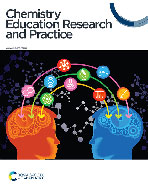Evaluative judgement – a practitioner's case in chemistry research projects†
Abstract
Engaging students actively in assessment, using a range of formative activities, consistently over sustained periods is a common recommendation in the assessment for learning literature. Despite this, practice still lags behind. Our case study aims to bridge the widening gap between theory and practice by illustrating the application of recent theoretical concepts in practice. The literature contains many examples and research on isolated events to engage students in assessment. Cases that explore engagement in different formative practices, over extended periods of time, are scarce and challenging for practitioners to implement in the absence of examples and evidence. Consequently, whilst adoption of theory informed practices remains limited, research also remains limited. Our case study aims to bridge the widening gap between practice and theory by elaborating a case example for practitioners. The redesign of a third year laboratory module, in which students undertake research projects, is presented. Our case illustrates how practitioners can incorporate assessment for learning principles, outlined in contemporary frameworks (evaluative judgement) considering process and a learning sequence over an entire year. The learning design of a module, before and after, is fully described to exemplify how practitioners can implement theoretical principles in practice. Students’ perception of the value of the new tasks were gathered to inform reflections for practitioners in the implementation of evaluative judgement.


 Please wait while we load your content...
Please wait while we load your content...